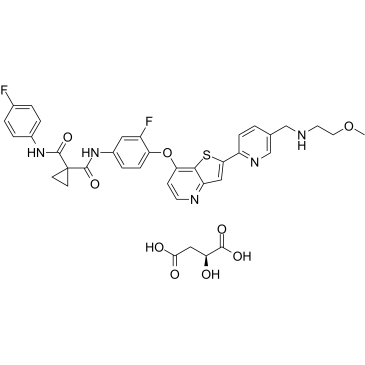2244864-88-6
| Name | Sitravatinib malate |
|---|
| Description | Sitravatinib malate (MGCD516 malate) is an orally bioavailable receptor tyrosine kinase (RTK) inhibitor with IC50s of 1.5 nM, 2 nM, 2 nM, 5 nM, 6 nM, 6 nM, 8 nM, 0.5 nM, 29 nM, 5 nM, and 9 nM for Axl, MER, VEGFR3, VEGFR2, VEGFR1, KIT, FLT3, DDR2, DDR1, TRKA, TRKB, respectively[1]. Sitravatinib malate shows potent single-agent antitumor efficacy and enhances the activity of PD-1 blockade through promoting an antitumor immune microenvironment[2]. |
|---|---|
| Related Catalog | |
| Target |
Axl:1.5 nM (IC50) MER:2 nM (IC50) VEGFR3:2 nM (IC50) VEGFR2:5 nM (IC50) VEGFR1:6 nM (IC50) TrkA:5 nM (IC50) TrkB:9 nM (IC50) KIT:6 nM (IC50) FLT3:8 nM (IC50) DDR2:0.5 nM (IC50) DDR1:29 nM (IC50) |
| In Vitro | Sitravatinib (0.01 nM-10 μM; 14 days) reduces colony formation in a dose-dependent manner in KLN205 and E0771 cell lines[2]. Sitravatinib (0.001-10 μM; 5 days) inhibits tumor cell viability with IC50s of approximately 1 μM in KLN205, E0771 and CT1B-A5 cell lines[2]. Cell Viability Assay[2] Cell Line: KLN205, E0771, CT1B-A5 cells Concentration: 0.001, 0.01, 0.1, 1, 10 μM Incubation Time: 5 days Result: Inhibited KLN205, E0771, CT1B-A5 cells with IC50s of approximately 1 μM. |
| In Vivo | Sitravatinib (20 mg/kg; p.o.; once per day for 6 days) significantly inhibits tumor progression and induces tumor regression in C57BL/6 mice bearing CT1B-A5 cells model[2]. Animal Model: 6-week-old C57BL/6 mice (bearing CT1B-A5 cells)[2] Dosage: 20 mg/kg Administration: Oral administration; once per day for 6 days Result: Significantly inhibited tumor progression and induced tumor regression. |
| References |
| Molecular Formula | C37H35F2N5O9S |
|---|---|
| Molecular Weight | 763.76 |
